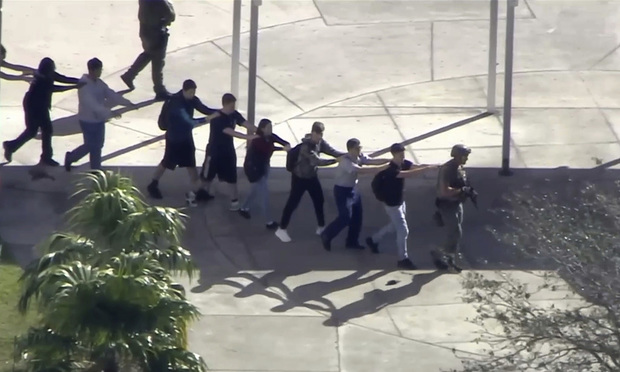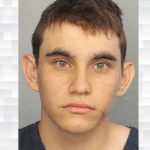 In this frame grab from video provided by WPLG-TV, students from the Marjory Stoneman Douglas High School in Parkland, Fla., evacuate the school following a shooting, Wednesday, Feb. 14, 2018. Credit: WPLG-TV via AP
In this frame grab from video provided by WPLG-TV, students from the Marjory Stoneman Douglas High School in Parkland, Fla., evacuate the school following a shooting, Wednesday, Feb. 14, 2018. Credit: WPLG-TV via AP
Fort Lauderdale criminal defense attorney James Lewis didn’t get to bed until 3 o’clock Thursday, and was up two hours later to start the day.
Lewis is one of a handful of Florida lawyers swept into a national horror story in the case of Nikolas Cruz, 19, who is accused of committing one of the deadliest school shootings in U.S. history. He represents a Broward County family who let Cruz move into their home last Thanksgiving weeks after his adoptive mother, Lynda Cruz, died Nov. 1.
The shooting drew international attention and sparked broad political debate about gun control, premises liability and the death penalty. For Cruz, who faces 17 murder counts, the case will likely become a matter of life or death if prosecutors choose to pursue the death penalty.
“There’ll be no sympathy. Nobody expects sympathy. The carnage, the loss are beyond words,” said Broward Public Defender Howard Finkelstein, whose office was waiting to learn whether it would represent the alleged shooter. “What will take place in court will not be about fixing that which can’t be fixed — meaning the families’ losses — but what is the appropriate and just response of our community, our society, our country.”
Among lawyers who might represent potential defendants in civil suits from the fallout of the Valentine’s Day shooting, the focus was on diverting attention from their clients and pointing to mitigating factors that might aid Cruz’s defense.
“It’s going to come down to experience and the ability to drown out the background noises and simply focus on the job at hand,” said David Weinstein, a former federal prosecutor who practices white-collar criminal defense as a Miami partner at Hinshaw & Culbertson. “With the number of victims … it’s clearly on paper a case that qualifies for the death penalty. However, they’ve got to balance the aggravating against the mitigating factors.”
Aggravating and mitigating factors would come into play if prosecutors seek the death penalty and a jury convicted Cruz. In this case, his youth and reported struggles with mental illness could play in his favor, but his defense would face an uphill fight, Weinstein said.
 Nikolas Cruz.
Nikolas Cruz.
The picture emerging of Cruz in the hours following the shooting is of an orphaned teenager expelled from Marjory Stoneman Douglas High School in affluent Parkland for disciplinary reasons. He lived with family friends after his mother’s death but was unhappy there and asked to move to a schoolmate’s home, news media reported. He faces multiple felony charges on accusations he sounded a fire alarm and used smoke grenades to lure students and staff into hallways before opening fire with an AR-15 semi-automatic weapon.
“It seems like the aggravating [factors] are going to be tremendous,” Weinstein said. “But all the mitigating factors haven’t been determined.”
Also undetermined is the potential liability for the Broward County school district and others who might be pulled into court to answer for the massacre.
‘ABSOLUTELY FORESEEABLE’
Because school shootings have become so frequent — Parkland was the 18th this year — schools are more likely to be held liable in civil court for student deaths and injuries, said Coral Gables attorney Todd Michaels.
Decades ago, school defense lawyers might have been able to argue a campus shooting was not a foreseeable incident and therefore could not have been prevented by the school. But that’s no longer the case, Michaels said.
“It is tragic, but it is absolutely foreseeable that issues like these are going to happen in schools,” said the premises liability attorney with the Haggard Law Firm. “As a result, these schools have an absolute legal duty to react.”
Broward County Public Schools did not return requests for comment by deadline, and its media relations line ran busy for hours.
The issue of school liability came up in 2011 when the Haggard firm obtained a nearly $1.9 million negligent security settlement with the neighboring Miami-Dade School District for the family of a boy who was stabbed to death at Coral Gables High School.
After the Parkland shooting, Michaels said he hopes to see increased school security measures such as metal detectors and ID checks along with better procedures for preventing students with disciplinary issues from escalating their behavior.
Although he believes deep national introspection about gun control and mental health is desperately needed, school officials must also do their part, Michaels said.
“You can ask society to do things,” he said. “You can ask the criminal justice system to do things. But unfortunately, because these issues have become repeated, we also have to count on premises to take the necessary steps to prevent instances like this.”
Unlike hotels, nightclubs and other venues sued after mass shootings, public schools are subject to sovereign immunity, meaning their liability in Florida is capped at $200,000 per person or $300,000 per tort claim. The Florida Legislature must approve any payout above the cap under a special claims bill.
Michaels hopes that won’t stop attorneys from representing victims’ families.
“If the only thing that’s going to get attention and cause actual change is a civil lawsuit, then lawyers have to take these,” he said. “This is an issue that affects every single person in our society.”
CHANGE OF VENUE?
News of the shooting trickled out over a matter of hours before the death toll was announced, creating a new hurdle for attorneys hoping to move the case to a venue away from the South Florida outcry.
”A change of venue is rarely granted to the defense,” Finkelstein said. “Usually these kinds of cases saturate the media for days, weeks or months.”
Miami criminal defense attorney Bruce Lehr agreed.
“Personally, I feel that with all of the national publicity that has been given this horrible event, you’d have to change venue to another planet,” said Lehr, a partner at Lehr Levi & Mendez in Miami. “Although the defense would move for it, I don’t know that it would be granted.”
An insanity defense would also prove difficult based on reports about the assault rifle, the bullets Cruz carried and what he wore: a shirt with school insignia.
“The Florida test is, at the time of the crime, being incapable of knowing right from wrong,” Lehr said. “From the media reports that doesn’t seem very likely.”
The Public Defender’s Office must determine whether it might have any conflicts in a case with 17 fatalities and hundreds of potential witnesses. For instance, the office might have to bow out if he represented any of the witnesses in other actions, Assistant Public Defender Gordon Weekes Jr. said. Lehr predicted the agency would assemble its most experienced team for the high-profile case.
“What do you do?” he asked. “It’s usually the most senior people who get these assignments, and with seniority comes a certain thickening of the skin.”


